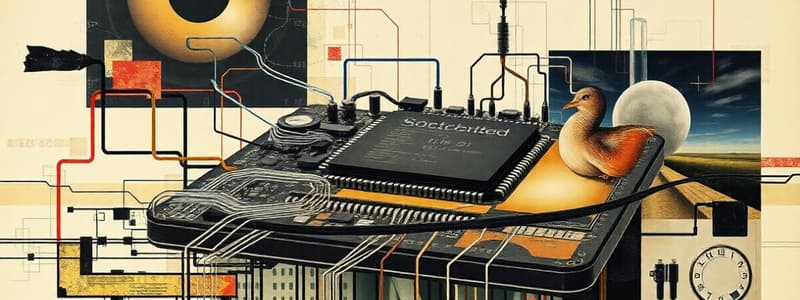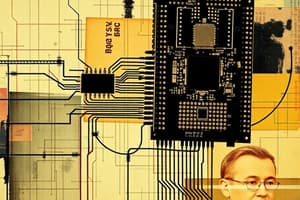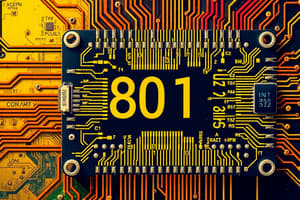Podcast
Questions and Answers
What technology was originally used to design the 8051 Microcontroller?
What technology was originally used to design the 8051 Microcontroller?
- NMOS technology (correct)
- Bipolar technology
- BiCMOS technology
- CMOS technology
Which of the following components is NOT included in the architecture of the 8051 Microcontroller?
Which of the following components is NOT included in the architecture of the 8051 Microcontroller?
- RAM of 128 bytes
- 16-bit timers
- 8-bit B register
- 32-bit accumulator (correct)
What is the purpose of the system bus in the 8051 Microcontroller architecture?
What is the purpose of the system bus in the 8051 Microcontroller architecture?
- To store permanent data
- To control external peripherals
- To connect devices to the CPU (correct)
- To generate power for the microcontroller
What is the total memory size for programs and data in the 8051 Microcontroller?
What is the total memory size for programs and data in the 8051 Microcontroller?
Which programming language is primarily used for 8051 Microcontroller programming?
Which programming language is primarily used for 8051 Microcontroller programming?
Which feature differentiates the 80C51 from its predecessor, the 8051?
Which feature differentiates the 80C51 from its predecessor, the 8051?
Which of these is NOT a function of the 8051 Microcontroller's internal RAM?
Which of these is NOT a function of the 8051 Microcontroller's internal RAM?
What is the primary purpose of the 8051 Microcontroller in embedded systems?
What is the primary purpose of the 8051 Microcontroller in embedded systems?
What is the primary function of the Central Processing Unit (CPU) within the 8051 microcontroller?
What is the primary function of the Central Processing Unit (CPU) within the 8051 microcontroller?
Which component of the 8051 microcontroller architecture allows for the storage of interrupt service routines?
Which component of the 8051 microcontroller architecture allows for the storage of interrupt service routines?
How many bytes of internal RAM does the 8051 microcontroller contain?
How many bytes of internal RAM does the 8051 microcontroller contain?
What distinguishes the first 128 Bytes of RAM in the 8051 microcontroller?
What distinguishes the first 128 Bytes of RAM in the 8051 microcontroller?
Which of the following types of interrupts are supported by the 8051 microcontroller?
Which of the following types of interrupts are supported by the 8051 microcontroller?
What type of memory is used for the program instructions in the 8051 microcontroller?
What type of memory is used for the program instructions in the 8051 microcontroller?
How is the 16-bit address bus utilized in the 8051 microcontroller?
How is the 16-bit address bus utilized in the 8051 microcontroller?
Which of the following best describes the function of timers in the 8051 microcontroller?
Which of the following best describes the function of timers in the 8051 microcontroller?
What is the role of the Oscillator in the 8051 microcontroller?
What is the role of the Oscillator in the 8051 microcontroller?
What kind of operation does the 8051 microcontroller perform with its I/O ports?
What kind of operation does the 8051 microcontroller perform with its I/O ports?
What feature allows the 8051 microcontroller to handle emergency tasks while executing its main program?
What feature allows the 8051 microcontroller to handle emergency tasks while executing its main program?
How many I/O pins does the 8051 microcontroller have?
How many I/O pins does the 8051 microcontroller have?
What is the maximum depth of the stack pointer (SP) in the 8051 microcontroller?
What is the maximum depth of the stack pointer (SP) in the 8051 microcontroller?
What is the primary advantage of having a timer in a microcontroller?
What is the primary advantage of having a timer in a microcontroller?
What function do the DPH and DPL registers serve in a microcontroller?
What function do the DPH and DPL registers serve in a microcontroller?
What function do microcontrollers serve in hybrid motor vehicles?
What function do microcontrollers serve in hybrid motor vehicles?
Which parameter is typically the first measurement in a data acquisition system?
Which parameter is typically the first measurement in a data acquisition system?
Which register in a microcontroller is primarily used to store the next instruction's address?
Which register in a microcontroller is primarily used to store the next instruction's address?
What role does signal conditioning play in data acquisition systems?
What role does signal conditioning play in data acquisition systems?
How is the PSW register categorized in the context of microcontroller architecture?
How is the PSW register categorized in the context of microcontroller architecture?
How do data acquisition systems contribute to research and development?
How do data acquisition systems contribute to research and development?
Which of the following best describes the stack in an 8051 microcontroller?
Which of the following best describes the stack in an 8051 microcontroller?
Which component of a data acquisition system is responsible for connecting to a computer?
Which component of a data acquisition system is responsible for connecting to a computer?
In the context of microcontroller memory organization, which statement is true?
In the context of microcontroller memory organization, which statement is true?
What is the primary role of the accumulator in microcontrollers?
What is the primary role of the accumulator in microcontrollers?
What is one primary benefit of real-time monitoring in data acquisition systems?
What is one primary benefit of real-time monitoring in data acquisition systems?
What is the consequence of generating hardware delays using timers in a microcontroller?
What is the consequence of generating hardware delays using timers in a microcontroller?
What is the role of a data logger in a data acquisition system?
What is the role of a data logger in a data acquisition system?
Which of the following addressing modes is NOT typically supported by microcontrollers?
Which of the following addressing modes is NOT typically supported by microcontrollers?
What do specialized sensors in data acquisition systems primarily measure?
What do specialized sensors in data acquisition systems primarily measure?
How are the general-purpose registers classified in microcontrollers?
How are the general-purpose registers classified in microcontrollers?
Why is accurate data collection crucial in data acquisition systems?
Why is accurate data collection crucial in data acquisition systems?
What aspect is managed by the control unit in a data acquisition system?
What aspect is managed by the control unit in a data acquisition system?
What is the significance of the 32 bytes of RAM used in a microcontroller?
What is the significance of the 32 bytes of RAM used in a microcontroller?
Which of the following is NOT a typical parameter measured by data acquisition systems?
Which of the following is NOT a typical parameter measured by data acquisition systems?
What determines the way data is accessed in a microcontroller?
What determines the way data is accessed in a microcontroller?
In terms of data types, what is one limitation of the 8051 microcontroller?
In terms of data types, what is one limitation of the 8051 microcontroller?
What does the analog-to-digital converter (ADC) do in a data acquisition system?
What does the analog-to-digital converter (ADC) do in a data acquisition system?
In what way do data acquisition systems aid in environmental monitoring?
In what way do data acquisition systems aid in environmental monitoring?
Which of the following is an example of an application of the 8051 microcontroller architecture?
Which of the following is an example of an application of the 8051 microcontroller architecture?
What primary function is attributed to sensors within a data acquisition system?
What primary function is attributed to sensors within a data acquisition system?
What is the primary purpose of calibrating sensors in a data acquisition system?
What is the primary purpose of calibrating sensors in a data acquisition system?
Which mechanism initiates data capture in a data acquisition system?
Which mechanism initiates data capture in a data acquisition system?
Which of the following is NOT a method for measuring current with the 8051 microcontroller?
Which of the following is NOT a method for measuring current with the 8051 microcontroller?
What is the primary function of an Analog-to-Digital Converter (ADC) in measuring pulse magnitude?
What is the primary function of an Analog-to-Digital Converter (ADC) in measuring pulse magnitude?
What type of storage solution is best suited for temporary data retention in a data acquisition system?
What type of storage solution is best suited for temporary data retention in a data acquisition system?
How does the 8051 microcontroller typically measure frequency?
How does the 8051 microcontroller typically measure frequency?
Which application can benefit from a data acquisition system's ability to monitor air quality?
Which application can benefit from a data acquisition system's ability to monitor air quality?
What is the significance of a Real-time Clock (RTC) in a data acquisition system?
What is the significance of a Real-time Clock (RTC) in a data acquisition system?
What is one of the key considerations when measuring speed using a rotary encoder?
What is one of the key considerations when measuring speed using a rotary encoder?
Why is data compression important in resource-limited applications?
Why is data compression important in resource-limited applications?
In a data acquisition system, which component is primarily used for user interaction?
In a data acquisition system, which component is primarily used for user interaction?
Which of the following is a correct step for measuring pulse width using the 8085 microprocessor?
Which of the following is a correct step for measuring pulse width using the 8085 microprocessor?
What type of sensor is commonly used for current measurement in a data acquisition system?
What type of sensor is commonly used for current measurement in a data acquisition system?
What is the advantage of using a timer in the context of an 8051 microcontroller for speed measurement?
What is the advantage of using a timer in the context of an 8051 microcontroller for speed measurement?
Flashcards are hidden until you start studying
Study Notes
8051 Microcontroller Architecture
- The 8051 microcontroller was developed by Intel in the 1980s.
- It utilizes Harvard Architecture, designed primarily for embedded systems.
- 8051 was initially built with NMOS technology, then transitioned to CMOS for lower power consumption.
- 8051 has a central processing unit (CPU) with various internal registers.
- The 8051 has an 8-bit data bus and 16-bit address bus.
- The 8051 uses a 16-bit program counter, data pointer, stack pointer, and a processor status word register (PSW).
- The 8051 has a 4KB ROM and 128 bytes of RAM.
- The I/O ports are arranged in four 8-bit ports (P0-P3).
- 8051 employs various addressing modes, including register, register indirect, immediate, indexed, and direct.
8051 Microcontroller Applications
- The 8051 finds application in energy management systems, measuring energy consumption using integrated sensors.
- Touch sensing functionality is often incorporated into 8051-based devices, seen in mobile devices like smartphones and media players.
- Automotive uses include engine control in hybrid vehicles and features like cruise control and anti-brake systems.
- Medical devices, such as glucose and blood pressure monitors, use 8051 microcontrollers to provide measurement accuracy and reliability.
Data Acquisition System
- A Data Acquisition System (DAQ) consists of sensors, measuring instruments, and a computer used to gather and process data.
- The DAQ system utilizes specialized software to capture, process, and store information.
- Handheld DAQ systems can be used for direct interaction with subjects, while remote DAQ systems are used for distant measurements.
- DAQ systems measure various parameters, including current, voltage, strain, frequency, pressure, temperature, distance, vibration, angles, digital signals, and weight.
- Sensors play a crucial role in specific parameter measurements, with voltage typically being the initial measurement.
Importance of Data Acquisition Systems
- DAQs are essential for accurate data collection, reducing human error and ensuring data integrity.
- Real-time data monitoring enables prompt responses to changing conditions.
- DAQ systems are vital in quality control for manufacturing and industrial processes.
- DAQ systems provide critical data for research and development in various fields.
- DAQ systems contribute to environmental monitoring and the assessment of pollution levels and climate change.
- DAQ systems are used for vital medical applications like patient monitoring.
- DAQs are essential for automation systems, enabling machines to operate without human intervention.
- DAQ systems facilitate data storage and retrieval for analysis, auditing, and compliance purposes.
- DAQ systems have significant applications in energy management systems.
Components of a Data Acquisition System
- The DAQ system comprises:
- Sensors, which gather data about physical conditions.
- Signal Conditioning, which filters and scales raw sensor data.
- Data Logger, which stores conditioned data over time.
- Analog-to-Digital Converter (ADC), which converts analog signals to digital data.
Data acquisition system components
- Interface allows the communication between the system and external devices
- Power Supply provides electrical power to operate the system and sensors
- Control Unit manages the system's operations, including triggering, timing, and synchronization
- Software lets users configure, monitor and analyze the data collected
- Communication Protocols enable the transfer of data between the system and other devices or networks
- Storage provides temporary and permanent storage solutions for data, including memory cards, hard drives, or cloud storage
- User Interface provides an interactive way for users to control the system
- Calibration and Calibration Standards ensure the accuracy of the system and sensors by periodically comparing them to known standards
- Real-time Clock (RTC) maintains accurate timing and ensures synchronized data acquisition
- Triggering Mechanism initiates the data capture based on pre-defined events or conditions
- Data Compression reduces the size of collected data for efficient storage and transmission in resource-limited environments
Applications of data acquisition systems
- Improve efficiency and quality control in manufacturing processes
- Monitor air and water pollution levels
- Collect scientific data for analysis and hypothesis testing
- Monitor vital signs and patient data in hospitals
- Assess vehicle performance, safety, and emissions
- Collect data during aircraft and spacecraft testing
- Monitor energy consumption in buildings and industries
- Evaluate infrastructure conditions
- Track vehicle locations, speed, and condition for logistics and safety
- Ensure stability and reliability of electricity generation, distribution, and consumption
Measurement of pulse width and magnitude using 8085
- Uses a timer to measure the duration of the pulse
- Uses an external interrupt to detect the rising and falling edges of the pulse
- Uses an analog-to-digital converter (ADC) to convert the analog pulse magnitude into a digital value
- Continuously samples the pulse using the ADC at a high rate
- Stores the maximum ADC value during the pulse duration to get the peak magnitude
Measurement of fundamental quantities using 8051 microcontroller
- Voltage Measurement: Uses an analog-to-digital converter (ADC) to convert analog voltage into a digital value
- Current Measurement: Uses a current sensor (shunt resistor or Hall-effect sensor) to convert the current into a voltage signal which is then converted into a digital value by an ADC
- Frequency Measurement: Uses a timer/counter to count the number of pulses within a fixed time period
- Speed Measurement: Uses a rotary encoder or a tachometer to convert the rotational speed into a digital signal, then the timer/counter counts the encoder's pulses over a fixed time period
Studying That Suits You
Use AI to generate personalized quizzes and flashcards to suit your learning preferences.





